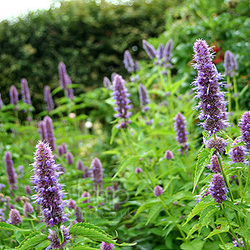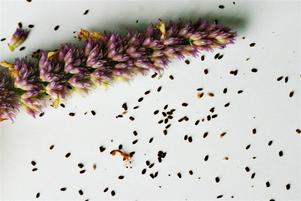 Agastache foeniculum, Anise Hyssop Agastache foeniculum, Anise Hyssop We can think of at least 180 great forest garden & perennial crops for cold climate Sweden. Want to hear about them? Over the course of the next year we will profile 5 a week on the blog. Perennial plants and crops offer a low energy, oil & resource input based foundation for future-proof agricultures. By default if an agriculture is to be called regenerative the bottom line is that it must be soil building, not soil depleting. Relentless deep tillage & poor soil husbandry (wifery?!) contributes to the majority of the 24 billion tons of topsoil lost every year on planet water. We are going to be focused on holistic polyculture grazing and perennial production at ridgedale over most of the site as this represents the most effective way to restore our degraded landscape, produce high value produce and ensure the future resource base we are managing holistically for in our decision making.  Genus Agastache Species foeniculum Common Name anise hyssop Form herb Habit clumping Origin North America Light sun to part Moisture dry to mesic Edible tea Anise Hyssop is in the mint family (Lamiaceae) It grows to 0.9 m by 0.4 m and is great for attracting bees and butterflys. This plant is native to much of north-central and northern North America. It is in the same family as hyssop, but they are not closely related. Hyssop (Hyssopus) is a genus of about 10-12 species of herbaceous or semi-woody plants native from the east Mediterranean to central Asia. Anise hyssop was used medicinally by Native Americans for cough, fevers, wounds & diarrhea. The soft, anise-scented leaves are used as a seasoning or tea. The purple flower spike is favored by bees who make a light fragrant honey from the nectar. The leaves are cardiac and diaphoretic. An infusion of the leaves is used in the treatment of colds & fevers. When left to go cold, the infusion is used to treat pains in the chest the lungs are sore from too much coughing). A poultice of leaves and stems can be used to treat burns. Prefers a sunny position and a dry well-drained soil. The young growth in spring is very susceptible to slug damage. OUR FRIENDS AT PFAF HAVE AN AMAZING DATABASE OF SPECIES (UK BASED);
0 Comments
Leave a Reply. |
Details
Like us on FB Below for regular updatesStay up to date with customized updates you want to receive
Upcoming coursesArchives
December 2016
Categories
All
|

 RSS Feed
RSS Feed